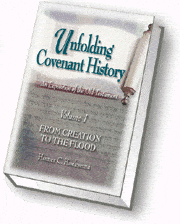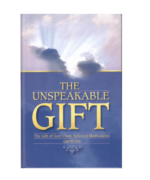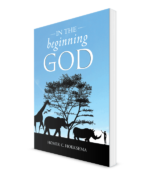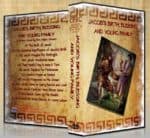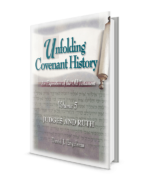From Creation to the Flood is the first volume in Unfolding Covenant History, a series that will include Old Testament history syllabi written by the late Professor Homer C. Hoeksema and additional syllabi being written by Professor David J. Engelsma, his successor as Professor of Dogmatics and Old Testament at the Theological School of the Protestant Reformed Churches.
Prior to the publication of this series, mainly seminarians were able to benefit from this valuable material. Recognizing the great potential for the edification and comfort to all of God’s people, the Reformed Free Publishing Association has undertaken the publication of this work in a series of hardcover volumes at the rate of approximately one per year under the editorship of Mark H. Hoeksema, Professor Hoeksema’s son.
The unique feature of these volumes, which distinguishes them from other such writings, is their emphasis on the theme of God’s covenant of grace as the unifying principle of Old Testament history and of the very gospel itself. The appreciation for this truth by the reader will grow during the unfolding of the meaning of the covenant as history progresses through the books of the Old Testament.
Volume I covers Genesis 1:1 through Genesis 6, a small portion of the scriptures, yet a period that encompasses 1,650 years of biblical history. In this volume Professor Hoeksema shows that the “book of beginnings” has a significance that holds for God’s people today and endures to the end of the ages.
Click here to read an excerpt from this book in Italian.
Click here to read an excerpt from this book in Spanish.
“These very readable volumes are a veritable treasure store into which, when the believer dips, he will surely increase his spiritual wealth” (The Outlook).
“With my wife and family I spent two weeks in St. Ives in Cornwall for our vacation, During that time I read Unfolding Covenant History, vol. 1. It made the holiday for me. Do you have volume 2 in stock? If you have would you please send it to me? … I look forward to hearing the tapes of the coming Lord’s Day …” – England
“I have started Hoeksema’s Unfolding Covenant History. I have finished the first volume and am in the middle of the second. It is a work with very deep theology and a good and detailed overview of sacred history!” – Hungary
“I have been reading the first two volumes of the Unfolding Covenant History by the RFPA, and must say that I have enjoyed them immensely. I find the covenant theology of the PRC most compelling. – England
“Please send to me the third volume of Unfolding Covenant History. These books are certainly addictive as the review on the cover suggests!” – England
BOOK REVIEW
Unfolding Covenant History: An Exposition of the Old Testament, Volume 1, From Creation to the Flood. Homer C. Hoeksema, author. Mark H. Hoeksema, general editor. Grandville, MI: Reformed Free Publishing Association, 2000. 327pp. [Reviewed by Rev. Steven R. Key.]
The Reformed Free Publishing Association continues to make a significant contribution in the publication of substantial Reformed and biblical books with the printing of the first volume in a new series entitled Unfolding Covenant History: An Exposition of the Old Testament. The first volume, From Creation to the Flood, was written by the late Homer C. Hoeksema, my esteemed professor of Dogmatics and Old Testament History in the Seminary of the Protestant Reformed Churches. Those of us who were privileged to sit under Prof. Hoeksema’s teaching are happy to see the content of his instruction now being made widely available by the RFPA. Prof. Hoeksema’s love for the Old Testament was well known. It was evident in his teaching and preaching. It is evident also in his writings.
The value of this volume—as will be seen in the rest of the series as it is published, God willing—is found in its careful, exegetical unfolding of the history of God’s covenant.
That perspective is rare in our day. Not only is the literal interpretation of these opening chapters of the Bible steadfastly maintained and reasonably expounded by Prof. Hoeksema, but there is a unique covenantal perspective in his exposition. His development of Old Testament history takes into account the organic perspective of all history, as well as the unity of sacred history with its focus always upon Christ and the realization of God’s covenant with His people in Christ.
This kind of treatment of Old Testament history, and particularly this covenantal and organic perspective, has been sorely lacking. In fact, one searches for it largely in vain even among other Reformed theologians. It is a refreshing approach to the unfolding of biblical revelation.
Adding to the value of this volume is a 17-page introduction to the series written by the editor, Mark Hoeksema. This introduction explains the organic unity of Bible history and the covenant character of that history as it also determines our approach and method in Bible interpretation. Prof. Hoeksema’s book illustrates that concretely, as will all the books in this series.
Because of the importance of the opening chapters of Genesis to the whole of biblical doctrine, this volume is particularly valuable.
Prof. Hoeksema’s treatment of the creation account shows his unwavering devotion to the historical and literal interpretation of this portion of Scripture. In his words, maintaining the truth of God as Creator and maintaining the biblical account of creation is a matter of life and death for the church. “The church herself must not exchange the testimony of revelation for the language of the wisdom of man.” We must sit humbly at God’s footstool to learn of Him. Scripture, after all, is God’s own narrative with regard to His own work. The creation account is a matter of clear revelation. “There simply is no room in the record of scripture for a process of any kind…. Scripture certainly presents the work of creation as immediate and instantaneous.”
Already in the opening chapters, Hoeksema gives careful attention to the time factor in Genesis 1, repudiating theistic evolution (or what since has been more deceivingly named by its promoters “progressive creationism”), the framework hypothesis, and other theories that reject the clear teaching of the Genesis account and its literal interpretation.
Hoeksema develops the truth, which is often overlooked, of creation as an act of the Triune God. The book also contains a careful treatment of each day of creation week, including the significance of man as “the crowning work of God in the earthly creation,” God’s covenant friend. Hoeksema repudiates any idea of a “covenant of works,” and shows that the covenant that God established with man is a relationship, a “living bond of communion, that highest and most perfect form of the bond of life,” indeed, a reflection of God’s own life as the covenant God.
The significance of both the tree of life and the tree of knowledge of good and evil is spelled out—the establishment of God’s antithesis for man.
Careful attention is also given in this volume to the fall of our first parents and the devastating effects of that fall for the whole human race and the creation. Resulting from the fall is death, the universality of sin, the total depravity of all persons, and therefore the need for the revelation of the wonder of grace in Christ Jesus.
The book goes on to take us through the history of Cain and Abel and faithful Enoch, the development of sin in the world, and the salvation of Noah and his family by the waters of the great flood, a universal flood which brought such drastic change to the world that “we do not live in the same kind of universe as did the prediluvian generations. We now live in the second world, as, by the wonder of God’s grace, it emerged from the waters of the deluge.” This, Hoeksema points out, is the plain teaching of II Peter 3:5, 6.
Not to be overlooked in the book is Hoeksema’s treatment of the genealogy of Genesis 4:16-5:32. The professor’s fascination with the genealogies of Scripture is revealed in his devotion of a chapter to that genealogy with its data and significance.
There is a wealth of sound instruction in this book. Although the material was prepared for the instruction of seminary students, it is written in a form understandable by those who are high school age and older. Much of it, in fact, is written in a preaching style. It is valuable for all.
In my review of this book, I found one thing missing that would enhance its value, and that is a subject and textual index. Because this book is not a verse-by-verse commentary, a subject and textual index would enhance its value as a reference work. Even so, the book is readable from cover to cover, and highly recommended.

